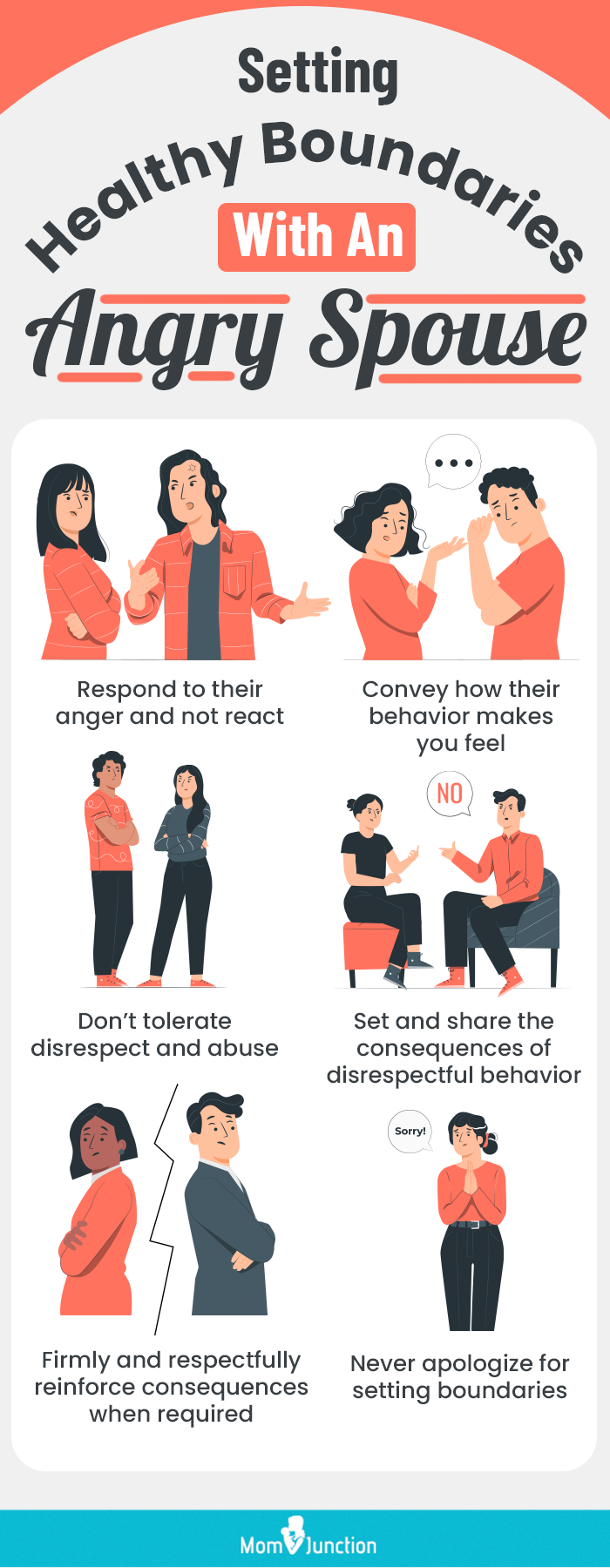
Image: iStock
Anger is a powerful emotion that can hurt the other person’s feelings if not kept under control. Handling an angry spouse can be all the more challenging. Situations at home can get difficult to deal with if one of the partners is angered and displeased and starts throwing temper tantrums and getting on the other person’s nerves. Anger not only affects communication but also causes extreme emotional distress and leads to long-term feelings of resentment. It might also lead one to lose patience and say objectionable things to their partner, which can permanently damage the relationship. If you’re in such a situation, read this post to learn about effective ways to deal with an angry husband/wife.
Key Pointers
- Marriages can be challenging when your spouse gets angry.
- Sometimes, it’s difficult to make them move on from something that triggered their anger, so try different ways to deal with it.
- Do not respond with anger as it may only make it worse for you.
Signs That Your Spouse Has Anger Issues
If your partner is always ready to snap because he is vexed and fuming, making you feel like you are walking through a minefield, then they could be dealing with anger issues. Here are the signs suggesting that you’re living with one angry spouse.
- Only unhealthy anger is expressed: Like the many human emotions, anger cannot be suppressed or eliminated. It must be shown in a healthy way that does not involve hurting the other person physically or emotionally. But people with anger issues tend to let it out in an unhealthy way: they would get aggravated over little things, shout, accuse, and sometimes give you the silent treatment.

- You feel depressed: Constantly facing heat and criticism is not an easy task. You could ignore their anger once or twice, but at some point in time, it will get to you. And when it does, it will leave you depressed and sad. You might be feeling that the love and affection towards your spouse are being replaced with hatred and resentment in a relationship because of their temper tantrums.
- Intimacy fades away: When you are always walking on eggshells to avoid the wrath of your spouse, there is little space for you to be emotionally involved with them. You are so scared all the time that you refrain from sharing your dreams and desires with them. As the feeling of love fades, physical intimacy becomes a chore. If your spouse is the one always talking and making decisions impulsively, and you are always listening and walking away to avoid a fight, then there is an imbalance in your marriage.
- It starts to affect your kids: The effects of a partner’s uncontrolled outraged behavior can be worse on the children if you have any. Kids usually learn from their parents. When they see a parent shouting, throwing a fit, and all riled up, they start to believe that such behavior is the way to get things done their way. They could also become timid and introverted fearing loud voices and anger. Constantly being exposed to anger and ridicule would also bring about changes in their developmental patternsiThe ways in which children acquire important milestones or skills as they grow older (1).

- They blame it all on you: One of the most apparent signs of an angry spouse is that they use their anger to cover up their mistakes. For example, if you find something suggesting that your spouse was cheating on you and confront them with it, they could react by screaming and ranting at you about false accusations, leaving you either feeling guilty, terrified or chafed to bring that topic up again.
 Point to consider
Point to considerCan you relate to one or all of these signs in your relationship? Dealing with an angry partner is not easy. But learning what triggers their temper and makes them so spiteful could make dealing with them easier.
Why Does A Person Get Angry Over Small Things?
In the US, the prevalence of inappropriate, poorly controlled, and intense forms of anger among adults is 7.8% (7). This indicates that a large portion of the population struggles with anger issues, and your spouse may be one of them. The next step in the problem is to figure out what triggers their anger and why they get angry so often. Keep reading, and you’ll know.
- Hormonal changes: Sometimes, even the usually sweet and calm ones get incensed and temperamental suddenly due to hormonal changes. In men, low testosteroneiA male sex hormone involved in muscle growth and sexual development can cause heightened anger, whereas in women, low estrogeniA sex hormone responsible for the development of female sexual characteristics is the cause of mood swings (2) (3). Lifestyle factors, such as diet and sleep, can influence the levels of these hormones.
- Increased stress levels: Stress because of work, financial troubles, or anything else can make one frustrated and indignant. It can cause anxiety and restlessness, which may result in anger outbursts (8). If your partner is almost always under pressure for whatever reason, then they could get exasperated at small things.
- Unaddressed childhood issues: Aggression can also be the result of childhood trauma. If your spouse grew up in a harsh environment where they were not appreciated and valued, they could become piqued individuals trying to suppress those emotional wounds. Childhood trauma creates a sense of powerlessness, causing individuals to have a negative self-perception and unfavorable outlook on the world. Persistent self-doubt and pessimism can lead to hopelessness, despair, anger, and frustration (9).
- Mental health issues: Unresolved or undetected mental health issues, such as depression, bipolar disorder, and ADHD, can trigger aggression and anger.Another lesser-known condition called IED (Intermittent Explosive Disorder) can cause a person to overreact or lash out in anger disproportionate to the situation that triggered them (10). Anger is also a key indicator of issues like Oppositional Defiant Disorder (ODD), Disruptive Mood Dysregulation Disorder (DMDD), and Borderline Personality Disorder (11).

- Failures in life: Certain incidents in life, such as infidelity, loss of a job, or infertility, can make the partners crossed and depressed. The fact that they were not able to succeed in life could also make them feel depressed, lonely and belligerent. And all these negative emotions could be brought out in the form of anger.
Chris, a blogger who has had anger issues, says, “I have a huge, huge problem with using my words as darts when I’m angry. My words pierce the hearts of my loved ones and continually chip away at any capital I might have remaining. The words I’ve said to the one I love so deeply are vivid in my mind these days, likely because I now go days without speaking with her. She brings up many of these angry words again in the limited conversations I have with her, proving that words are never able to be unspoken (i).”
A study conducted in 2018 showed the percentage of Americans who said they experienced stress, worry, and anger. As shown in the graph below, the stress and anger rates significantly become higher in individuals in the 15-29 age group. While stress levels remained the same in the 30-49 age group, anger slightly reduced. Anger and stress is shown to further reduce in people 50 and above.

U.S. respondents experiencing increased stress, worry, and anger by age
Source: Percentage of respondents in the U.S. who experienced stress, worry, and anger a lot in the year 2018, by age; Statista Quick fact
Quick factYour spouse could be angry due to any of these reasons or others, and may not even know how their anger is affecting the people around them. So, before judging your partner and labeling them as incandescent, moody, or temperamental, try to understand what makes them angry and figure out ways to deal with them.
How Does Anger Affect A Relationship
Uncontrolled and unaddressed anger can cause irreparable damage to a relationship. Although certain forms of anger are justified when the situation calls for them, unchecked, explosive anger can destroy a relationship. Here’s how:
- Communication breakdown: Anger leads to erosion of communication. In a fit of rage, your partner may say hurtful things that they may not even mean. However, it may impact you mentally and you may become wary of interacting with them, which can lead to communication breakdown.
- Loss of trust: Relationships sustain trust. But when your partner has anger issues, it becomes difficult to trust them as you may not know how they may react to a certain situation.
- Noble mistake: You may start repressing your anger, hoping your partner will eventually recognize your sacrifice. However, this seldom happens and instead, you are trapped in a vicious bubble of silent suffering where you believe yourself to be doing a noble deed by putting up with or absorbing your partner’s negativity.
- Decreased relationship satisfaction: Eventually the positive aspects of your relationship can be overshadowed by the negative caused by anger issues. This can lead to feelings of dissatisfaction in a relationship.
- Toxic environment: Unresolved anger issues can create a toxic environment where neither you nor your partner feels safe or supported. When this safety net is broken, it can lead to emotional withdrawal and increased conflict and create a vicious cycle of misunderstandings and even more anger.
- Aggression: Unregulated anger combined with a lack of self-control can cause you to lash out at your partner, leading to negative consequences. Studies indicate that individuals who internalize negative emotions, such as anger and hostility, are more likely to perpetrate IPV (intimate partner violence) compared to those who don’t (12).
7 Ways To Deal With An Angry Spouse
Knowing how to handle your partner when they’re angry can be challenging, but it’s essential for maintaining a healthy relationship. Here are some effective ways to deal with an angry spouse.
- Never face anger with anger
Getting angry with an already angry spouse will only fuel their temperament and make things worse. As the saying goes, ‘An eye for an eye will make the whole world blind.’ So, instead of ‘giving it back to your spouse’, try to stay calm and give them time to calm down.
We know it is easier said than done. Your spouse’s angry words could have provoked you, but try not to lose it, get aggrieved, and cause a feud. Count to ten or take deep breaths to calm yourself in order to prevent a blow-up. If you can practice this for a month, you will be amazed by the changes it can bring in your spouse’s behavior.
Why it works: When you respond to aggressive behavior calmly, it helps prevent emotional escalation. Anger can be contagious—you might feel compelled to react in the same way as your partner. However, staying calm can help de-escalate the situation and create an emotionally safe space for you and your spouse.
- Set clear boundaries
To stay calm when your spouse is angry doesn’t mean you tolerate anything and everything. Set clear boundaries as to what you can tolerate, and let them know calmly whenever they are crossing boundaries and causing a hissy-fit. For example, when your spouse resorts to name-calling, then tell them in a calm voice that this is not acceptable. Setting boundaries is an effective way to keep your spouse’s anger in check. When they realize their mistake, chances are they will not repeat it.
Why it works: Healthy boundaries protect your self-respect and signal to your spouse what is acceptable behavior and what you will not tolerate. Enforcing consistent consequences helps your partner gradually recognize the behaviors you value and be less likely to provoke you.

- Choose on what to fight
An aggressive spouse will always look for an opportunity to get angry with you. The smart thing to do is not give them that chance. This doesn’t mean you agree to whatever they say, but pick your battles wisely. There are a few things where you can easily compromise, and a few you cannot. Discuss those non-negotiable issues and don’t dwell on every silly thing.
Why it works: When you prioritize certain issues over others, you can reduce unnecessary disagreements. Unproductive arguments lead to nowhere and only serve to cause emotional distress, while focusing on important issues reduces stress and improves your problem-solving efficiency.
- Never tolerate disrespect
No matter how much you endure your spouse’s aggressive behavior, never tolerate disrespect. If you start tolerating this, then you are indirectly telling your spouse that they can get away with anything. Always take a stand if you feel that your partner is disrespecting you and let them know it is not okay. Use words like ‘this is not acceptable,’ or ’we can resume our discussion after you calm down’ and leave the room.
Why it works: When you tolerate disrespect, it sends the wrong signals to your partner and reinforces their negative behavior. Ignoring your boundaries teaches your partner that their aggression is permitted. But, when you enforce your rules and assert your values, you can break that cycle.
- Find out the real reason
If you feel that your spouse’s anger is due to pressure at work or some other reason, then try to get them to talk about it. Listening to their issues without judging them lets them know that you are there for them and they can trust you. If necessary, you can try and convince them to seek professional help on how to manage their anger better.
Why it works: Determining the reason(s) behind your partner’s aggressive behavior can help build trust and promote emotional validation. By empathizing with your spouse, you offer them a safe space where they don’t need to hide behind anger. Understanding their emotional triggers can strengthen your bond as a couple and reduce their defensive outbursts.

- Focus on the good things
Your partner might get angry often, but they may also be loving and caring. Invest in those positive emotions, and try to nurture them. Pretty soon, you will start seeing them from a place of love and not hatred. Your spouse might have uncontrollable anger, but once they cool down if they apologize, then forgive them.
Why it works: Practicing positive reinforcement shifts your focus from negativity to positivity, which helps build emotional goodwill. When you show gratitude, your spouse steps back and empathizes, ultimately strengthening your relationship.
- Know when to leave
Unfortunately, you cannot always work things out with someone who is always angry. No matter how hard you try, their aggression may not seem to subside; it could even turn into physical abuse. If your spouse doesn’t see their aggression as an issue and refuses to seek help, then it is not on you to suffer. Walk away from things you cannot change.
Why it works: Protecting yourself can reduce emotional harm. Prolonged exposure to aggressive behavior can cause low self-esteem, emotional distress, and trauma. Walking away from a relationship where your emotional and physical safety is at risk is sometimes the only choice.
 Quick tip
Quick tipWhen you have reached a saturation point, take a call, and do what is right for you and your kids.
Long-Term Strategies To Manage Your Spouse’s Anger
Dealing with an angry spouse can be mentally and emotionally exhausting. But, with patience, understanding, and perseverance, you can figure out long-term strategies to manage your spouse’s anger issues. However, remember that the effort must come from both ends. Here are some tips to help:
- Self-awareness and reflection: Help your spouse identify situations, thoughts, or feelings that trigger their anger. It will help them manage their emotions better. You can also encourage them to record their angry outbursts in a journal to reflect on what makes them rage. Help them consider others’ perspectives. Over time, this will build their emotional awareness and reduce the intensity of their anger.
- Open communication: Create a safe space where your spouse feels heard and accepted. Actively listen and acknowledge their feelings without judgment. Then, when you express your concerns to your spouse, use “I” statements instead of blaming them. For example, say, “I get worried when I see you getting angry.” Most importantly, discuss sensitive topics only when you both are calm. Do not engage in serious conversations when tensions are high.
- Model healthy coping mechanisms: Teach your spouse some deep breathing exercises, like the 4-7-8 method (4 seconds inhale, 7 seconds hold, and 8 seconds exhale). Doing this can calm their nervous system during anger. You can also model healthy mindfulness practices, like meditation and yoga, or exercise, like running or walking, so they feel encouraged to practice them. These activities can help regulate emotions and release tension and frustration, preventing outbursts.
- Develop conflict resolution strategies: Setting firm boundaries on acceptable and unacceptable behavior isn’t enough. You must also work on finding common ground through effective conflict resolution. For example, you can agree on a time-out, so when arguments escalate, you can take a break to cool down before resuming the discussion. You may also create a mutual plan for what to do when anger goes out of hand, for instance, using a code word or walking away.
- Get professional help: Individual or couples therapy, anger management programs, and support groups can help manage anger and improve communication skills. They can also teach skills to control anger in the heat of the moment. Remember, getting professional help can get you closer to discovering the real reason behind your spouse’s anger. Addressing these issues can help in long-term anger management.
Frequently Asked Questions
1. What mental illness is associated with anger?
Borderline personality disorder, bipolar disorderiThe psychological condition that makes the person experience severe mood swings and behavioral changes , oppositional defiant disorder, intermittent explosive disorder, and disruptive mood dysregulation disorderiA childhood condition of extreme irritability and anger that may lead to frequent temper tantrums are some mental illnesses where extreme or recurrent anger may be seen (4).
2. What does the Bible say about dealing with an angry spouse?
“Be quick to hear, slow to speak, and slow to anger” (James 1:19-27), instructs Apostle James. God instructs one should learn how to express anger instead of lashing it out. Experiencing anger is not wrong, but having wrong thoughts, behavior, or reactions in response to your anger is condemned. The Bible teaches people that anger should be short-lived and should be dealt with in a Christ-like and Biblical manner. One should not sleep with their differences unresolved (5).
3. Are anger issues permanent?
Anger issues are not necessarily permanent. Individuals with such issues can learn to control and reduce their anger over time with the proper approach, commitment to change, and solutions. It’s critical to realize that everyone experiences rage to some extent because it’s a common emotion. On the other hand, unchecked or persistent anger that interferes with daily life and relationships can be detrimental.
4. Is it normal for a spouse to be angry all the time?
Being constantly angry as a spouse is not regarded as normal or healthy. Although experiencing anger now and then is common, persistent and severe rage can destroy relationships, foster a toxic environment, and even cause physical, emotional, and psychological harm. To understand the underlying causes and create healthier coping methods, one must address persistent anger and seek the proper support.
5. What role does past trauma or emotional baggage play in an angry spouse’s behavior?
Unresolved emotional trauma or scars from the past can affect how people see and react to situations, including their expression of anger. Traumatic events or unresolved emotional problems can cause emotional triggers. These triggers may cause an individual to respond with anger in situations that remind them of the original trauma or evoke strong negative emotions associated with their past.
Occasional disagreements and disputes amongst married couples are normal. However, if it becomes chronic, frequent, and unmanageable, it can harm the family equation as well as have a negative impact on the kids. Accepting the problem is the first step toward becoming the best version of yourself. Learning tips and techniques for anger management is essential if one wants to manage their outbursts without hurting their spouse. Therapy or anger management sessions are some options for getting mental health support.
Infographic: How To Set Boundaries With An Angry Spouse?
Living with a person with anger issues can be challenging. An angry spouse can use anger to instill fear, gain control, and set authority in the relationship. It’s essential to set healthy boundaries in the relationship to ensure their behavior does not negatively affect you. Our infographic brings you steps that will help build boundaries with an angry spouse and safeguard your emotional health. Illustration: Momjunction Design Team
Illustration: Ways To Deal With An Angry Spouse

Image: Dall·E/MomJunction Design Team
Take a look at this video to learn how to handle an angry spouse. Get tips on how to de-escalate and manage anger in a relationship.
Personal Experience: Source
MomJunction articles include first-hand experiences to provide you with better insights through real-life narratives. Here are the sources of personal accounts referenced in this article.
i. Anger & control ends marriages;https://medium.com/@chris_43817/anger-control-ends-marriages-f7ed56b379ed
References
- Nastassia J.Hajal, et al.; Angry responses to infant challenges: parent, marital, and child genetic factors associated with harsh parenting; US National Library of Medicine National Institutes of Health.
- Menelos L. Batrinos; Testosterone and aggressive behavior in man; US National Library of Medicine National Institutes of Health.
- Esperanza Navardo-Pardo; Carol A.Holland; Antonio Cano; Sex hormones and healthy psychological aging in women; US National Library of Medicine National Institutes of Health.
- Ephrem Fernandez and Sheri L Johnson; Anger in psychological disorders: Prevalence, presentation, etiology and prognostic implications; National Library Of Medicine
- Dealing With Anger in Marriage; Cornerstone Marriage & Family Ministries
- Jessie N. Doyle et al.; Occupational Stress and Anger: Mediating Effects of Resiliency in First Responders; Journal of Police and Criminal Psychology
- Mayumi Okuda et al.; Prevalence and correlates of anger in the community: results from a national survey; Cambridge University Press
- Stress Management; Mayo Clinic
- Childhood Trauma May Lead to Anger in Adulthood; Northlake Behavioral Health System
- Intermittent Explosive Disorder; Cleveland Clinic
- Ephrem Fernandez et al.; Anger in psychological disorders: Prevalence, presentation, etiology and prognostic implications; US National Library of Medicine National Institutes of Health
- Erica Birkley et al.; Anger, Hostility, Internalizing Negative Emotions, and Intimate Partner Violence Perpetration: A Meta-Analytic Review; US National Library of Medicine National Institutes of Health
Community Experiences
Join the conversation and become a part of our nurturing community! Share your stories, experiences, and insights to connect with fellow parents.
Read full bio of Iten Elyassaki
Read full bio of sanjana lagudu
Read full bio of Shikha Thakur
Read full bio of Benidamika J Latam
















